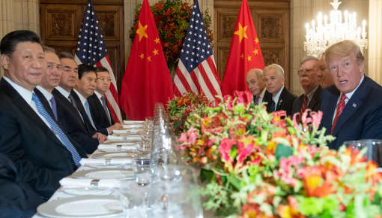- Ameya360 Component Supply Platform >
- Trade news >
- Trump's trade war is forcing Beijing to retreat from its own anti-debt battle
Trump's trade war is forcing Beijing to retreat from its own anti-debt battle
Just as China started to come to grips with the scale of its massive debt accumulation, the impact of the trade war with the U.S. is forcing a retreat.
One expert said that could prove "disastrous" for the country's economy.
Years of big-ticket investment projects helped spur double-digit growth in China's gross domestic product, sending the country into position as the world's second-largest economy — trailing only the United States.
The price tag, however, was a mountain of debt that needed to be drawn down as authorities refashioned growth to a more sustainable model. The plan has been to base the more mature economy on the increasing spending power of China's rising consumer class rather than old-fashioned investments in infrastructure.
But the trade war is denting China's economic growth and forcing a rethink in debt reduction — known as deleveraging — as authorities look for ways to juice the economy to make up for hits resulting from U.S. President Donald Trump's tariffs on Chinese exports.
Economists increasingly see future tariffs as likely to apply to all shipments from China to the United States, meaning Beijing is set to even further loosen financial taps.
That's already been seen in the form of cuts to reserve requirement ratios for banks, which set the amount of funds they must keep on hand. The recent moves mean banks have more money to lend out, stimulating the economy with more debt.
Li-Gang Liu, chief economist for China at Citi, said that a major stimulus announced last month by Guangdong Province, China's export center, that includes tax, land and utilities measures, is a prime example of the new trend in the country.
"Such kind of policy suggests that going forward China's deleveraging has more or less halted," Liu said on CNBC's "Squawk Box" on Wednesday. "We will see more fiscal and monetary stimulus ahead."
'Could be disastrous'
A Citi report on Monday estimated that the deleveraging pause will increase China's debt-to-GDP ratio by 12.3 percentage points to 274.5 percent by the end of this year, reversing a small decline in 2017.
"The markets are right, in our view, to feel more concerned about the sustainability of China's debt and the increased financial risks," Citi said.
Andrew Collier, managing director at Orient Capital Research in Hong Kong, said that there's likely to be "leakage" in China's debt economy — meaning that those who need credit will find a way to get it through the shadow banking system.
"So I'm not optimistic that there will be significant deleveraging in 2019 and that means that the existing debt level is likely to maintain at the current levels or even rise, which could be disastrous," Collier said at a conference on Oct. 10.
"At some point you're going to have a defaulting situation in different parts of the system," he said.
Collier raised the possibility of municipal government defaults, which he described as "more or less unheard of in China."
Ray Heung, senior vice president in the Financial Institutions Group at Moody's Investors Service, said the Chinese government will continue to support the banking system, focusing on larger banks — but attending to smaller ones that have a relationship with a local government or play a social role.
"We do think that one of the overriding factors is actua
Online messageinquiry

China's Xi is about to deliver a speech that could have major consequences for the trade war

US will hold off on raising China tariffs to 25% as Trump and Xi agree to a 90-day trade truce

Expect a photo op and a 'mock deal' at the Trump-Xi meeting — not a long-term truce, says economist
- Week of hot material
- Material in short supply seckilling
| model | brand | Quote |
|---|---|---|
| MC33074DR2G | onsemi | |
| BD71847AMWV-E2 | ROHM Semiconductor | |
| TL431ACLPR | Texas Instruments | |
| RB751G-40T2R | ROHM Semiconductor | |
| CDZVT2R20B | ROHM Semiconductor |
| model | brand | To snap up |
|---|---|---|
| BU33JA2MNVX-CTL | ROHM Semiconductor | |
| BP3621 | ROHM Semiconductor | |
| TPS63050YFFR | Texas Instruments | |
| IPZ40N04S5L4R8ATMA1 | Infineon Technologies | |
| ESR03EZPJ151 | ROHM Semiconductor | |
| STM32F429IGT6 | STMicroelectronics |
- Week of ranking
- Month ranking
Qr code of ameya360 official account
Identify TWO-DIMENSIONAL code, you can pay attention to


Please enter the verification code in the image below:






















